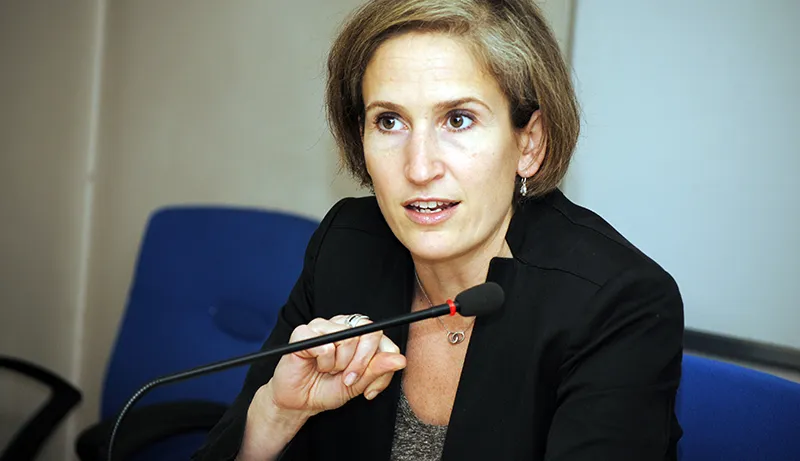-
CENTRES
Progammes & Centres
Location
Describing the US's 'Pivot to Asia' as "rhetoric without reassurance", Chatham House scholar on US foreign policy says it is a great strategy, but it has been badly implemented.

The United States’ ’Pivot to Asia’, announced by the Obama administration, placing a great degree of emphasis on America’s hard power, is a great strategy, but it has been badly implemented, according to Dr Xenia Dormandy, a renowned expert on US foreign policy from Chatham House.
Addressing the faculty of Observer Research Foundation in Delhi on May 2, 2013, Dr Dormandy said the emergence of this rhetoric has raised expectations about the potential role to be played by the US in the changing geopolitical landscape in the Asia-Pacific region.
Dr Dormandy denied that the pivot to Asia is a China centric policy, claiming that America’s Asia policy is not driven by China; rather America’s China policy is driven with Asia. However, she conceded that the pivot can be termed as ’rhetoric without reassurance’, noting that the US could seek to make the TPP more robust by adding a military dimension to the partnership. She also denied that America has endorsed an idea of a G2 grouping, claiming that bipolarity is not in the interest of any of the nations in the region.
She said amongst the security challenges faced by the region, the presence of nuclear weapons in China, North Korea, Pakistan and India form the major focal point. Other challenges are spate of territorial disputes amongst several nations, continual problems with both terrorism and piracy, as well as China’s potential role as a regional hegemon.
Dr Dormandy said in responding to these challenges, there are many different perceptions and priorities; however, the American response has been quite singular.
She said the American ’Pivot to Asia’ has placed a great degree of emphasis on US hard power. The pivot has included the stationing of marines at a base in Darwin, Australia and the deployment of Littoral Combat Ships in the Philippines, Singapore and Vietnam. It has also manifested in the form of an economic partnership, namely the Trans-Pacific Partnership.
Dr Dormandy argued that the emergence of this rhetoric has raised expectations about the potential role to be played by the US in the region. However, the strategy has been implemented badly. The recent visit of John Kerry, the new Secretary of State, to Japan and South Korea has been characteristic of this assessment, where he was unable to reassure leaders that they will have American support in this tense security climate.
Although the US will continue to be a Pacific power, it is likely that they will lessen their engagement in the region. America’s domestic economic travails are expected to result in defence spending for the Obama administration. It is also unlikely that the US will go to war, at least in the conventional sense, on economic or resource based confrontation. Dr Dormandy ruled out the possibility of a direct military engagement. Whilst it is certain that China will become economically more powerful over the next few years, factors such as corruption and political competition between the military and the Communist Party add a degree of uncertainty to the situation.
In Japan, there is bipartisan support for a more nationalistic policy to confront China’s assertiveness. There is a growing concern that if America is to lessen its engagement in the region, Japan will need to revision its post-war constitution. Dr Dormandy claimed that if there is a reunification of the Korean peninsula and the North’s nuclear weapons are retained by the successor state, Japan may be prompted to seek nuclear weapons. She claimed that America’s Asian allies will have to get used to what America’s European allies are now coming to terms with - that America will support its allies, but it will not play a leading role.
Within this context, it is necessary for Asian nations to envision a new security strategy. While Asian nations are expected to increase their defence spending in next few years, it is questionable whether there can be a greater convergence of interests and a deepening of alliances. It is important to note that America’s changing role will create a vacuum. Ideally this vacuum should be filled with what Dr Dormandy termed a ’network of networks’: a contiguous set of agreements between nations on the bilateral, trilateral and multilateral level. This would be a step in making the region free of the tensions that stem from the precariously balanced status quo.
In responding to questions raised regarding America’s foreign policy, Dr Dormandy argued that it must been seen in the context of America’s national interests, domestic economic woes and with regard to China’s own policies. She also claimed that the Obama administration has kept foreign policy within the Oval Office. Positing a damned if you do and damned if you don’t situation for America in the region, she added that for America to leave an unfilled vacuum is dangerous, to allow China to fill that vacuum is also dangerous and the same holds true for maintaining the current situation.
With regards to the lull in Indo-US relations, Dr Dormandy placed the blame on India, claiming that US is ready to enhance military cooperation. She added that the expectations were far too high following the nuclear deal. However, she conceded that there is no scope for sentiment and that any prospective cooperation should further mutual interests. She also noted that there is a problematic balance that most countries in the region have between economics and security, wherein their largest trading partner is China but still depend on the US for military support.
(This report is prepared by Kartikeya Khanna, Research Assistant, Observer Research Foundation, Delhi)
The views expressed above belong to the author(s). ORF research and analyses now available on Telegram! Click here to access our curated content — blogs, longforms and interviews.